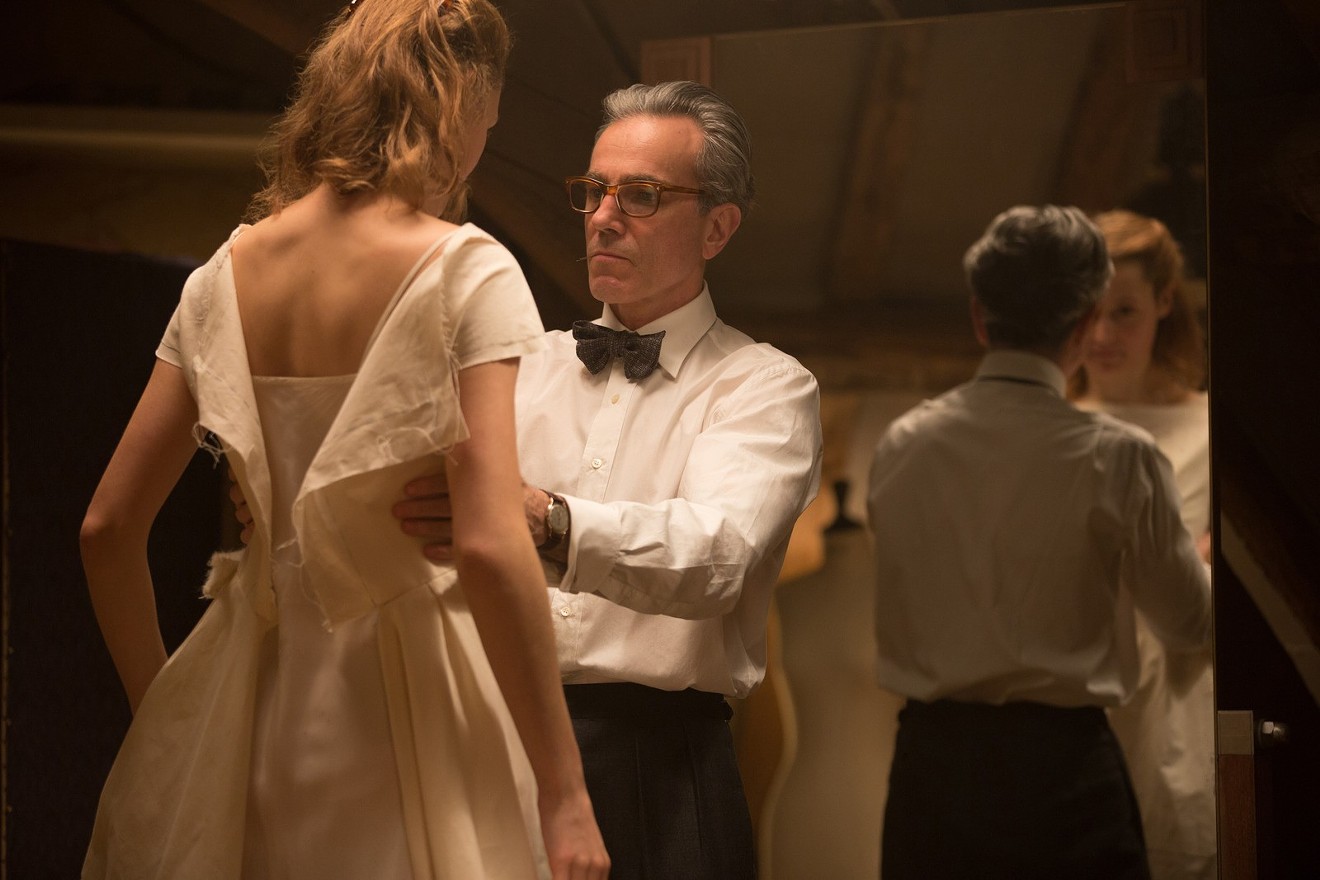That’s just one of the ways that Phantom Thread plays on our sense of expectation. Here’s another: The last few films from director Paul Thomas Anderson — who releases movies about as often as Day-Lewis does — have been strikingly unconventional in their style. Think of his drifting, elliptical Thomas Pynchon adaptation Inherent Vice, his enigmatic, angry cult drama The Master or his dissonant rom-com deconstruction Punch Drunk Love. At first, Phantom Thread unfolds in smooth, clean, classical fashion. I have no idea how someone who is totally unfamiliar with Day-Lewis or Anderson will process this movie, but I was initially taken with what wasn’t there. No atonal bursts of music, weird narrative digressions or surreally twisted characters. At least, not at first.
Set in the 1950s, Phantom Thread follows the life of British fashion designer Reynolds Woodcock (Day-Lewis), a man quietly, intensely devoted to his work. He draws and patterns, a small army of middle-aged seamstresses actually creates the dresses, and his disciplinarian sister Cyril (Lesley Manville) keeps things moving and drama-free. Cyril doesn’t just oversee the business; she also manages the arrival and removal of Reynolds’ paramours. “What do you want to do about Johanna?” she asks him early on, about his most recent girl. “She’s lovely but the time has come,” he replies. “I’ll give her the October dress,” Cyril says, matter-of-factly, like a human resources functionary preparing a severance package.
Then into Reynolds’s life comes Alma (Vicky Krieps), who serves him at a small cafe while he’s driving to his country cottage, and he’s immediately smitten. The attraction is mutual, and despite her hesitant, coy demeanor, Alma clearly understands that the first flush of romantic yearning can transform every little gesture into a seduction; even the way she pours tea at that first meeting carries a sexual charge. Before he asks for her details, she’s already written it all out on a slip of paper: “For the hungry boy. My name is Alma.”
Is she merely the latest in a long line of disposable conquests? Soon enough, Reynolds is taking her measurements, and the seriousness of purpose with which he does so — and the coolness with which he calls out the numbers that delineate her physical presence in the world — suggest that Alma only exists for him to the extent that he can quantify and categorize, and maybe even mold, her. “You have no breasts,” he remarks. “Yes, I’m sorry,” she replies, awkwardly. “No,” he says. “You’re perfect. It’s my job to give you some if I choose to.” Reynolds likes his life orderly, for everything to be just so. In that context, other humans — especially lovers — are disruptors, and it’s not long before he’s bristling with annoyance at the way Alma butters her toast in the morning or (irony of ironies) the way she pours her tea.
Phantom Thread unfolds so quietly that the questions it’s asking about the nature of desire and attraction, and its delicately confrontational back and forth between Alma and Reynolds, may not register immediately. Anderson confines much of the action to the modest interiors of Reynolds’ world. His house also serves as his atelier, adding to the claustrophobia and the blurring of lines between life and work. And the whole film has the air of a chamber drama, an intimate and deliberate affair where emotions are played out in hushed whispers and subtle glances. If the director’s earlier films boasted vigorous, look-at-me call-outs to the likes of Martin Scorsese and Stanley Kubrick and Elia Kazan, Phantom Thread reminded me of nothing so much as that small handful of muted, mesmerizing chamber dramas Luchino Visconti made in the 1970s in the wake of his stroke. (The film is also dedicated to the late Jonathan Demme, one of Anderson’s great touchstones, and one can see here the same attention to gestures and gazes that Demme offered in his final narrative effort, Ricki and the Flash.)
The fashions on display are certainly lovely, but not ostentatiously so, and Anderson focuses less on their visual beauty than on their symbolic value.
tweet this
The fashions on display are certainly lovely, but not ostentatiously so, and Anderson focuses less on their visual beauty than on their symbolic value — for example, on the fact that Reynolds likes to sew little thoughts and words into the seams of his clothes, and on the mystical weight he gives his work. “Why are you not married?” he is asked. “I make dresses,” he replies. “Marriage would make me deceitful, and I don’t ever want that.” “You sound so sure of things.” “I’m sure of that.”
Meanwhile, Jonny Greenwood’s gentle score washes over the film in what seems like an endless medley of movements — sometimes jaunty, sometimes lush, sometimes somber. The music itself is minimalist, but its use isn’t; the music pretty much never lets up until about halfway through the picture — when someone suddenly utters these three words: “I love you.” That’s when it really becomes clear that Anderson’s seeming conventionality is something of a ruse — that he’s interrupting the gently rolling reserve with jagged moments of emotion, like little rips in the fabric. Perhaps appropriate to its subject, Phantom Thread is a film of contrasting textures, but it’s a counterintuitive one. Most tales of people finding love present hard, angular worlds and allow romance to soften the edges. Phantom Thread does the opposite: It presents a soft, even sensuous world, and shows us how sometimes love can come in the cuts and the tears.











